- In Turkey, what do people do or say (or not do or say) if they want to be seen as gay [lesbian] [straight]?
If you speak or talk femininely people. Or when your gestures are girly. Or even if you are a male who wears earrings people may think you are gay. Or if you are a female who prefers short hair may make people think you are a lesbian. So people do the exact opposite thing mentioned above in order to seem like a straight person.
- How is this different in another country? How is it similar?
Actually, it may differ for other countries but the general ideas about being an LGBTQI+ member are almost the same for every country.
- Why do people sometimes want to be seen as straight [bisexual][lesbian]? Why do they sometimes not want to?
People want to be seen as straights for several reasons. These may include social factors, religion, and family. First of all the family is the majör reason why LGBTQI+ members want to seem like straights. Especially if they are not economically independent. Or they prevent as straights just not to upset their parents. Because most of the LGBTQI+ members believe that when their parents find out the truth about their identity they won't accept them even worse disown them. Some LGBTQI+ members try to pretend that they are straight just because it is a sin in their religion. And last but not least LGBTQI+ members pretend to be straight to be accepted into the social environment.
- Is it easy to identify someone as gay [straight] [lesbian]? Why or why not?
No, it's not you can not know whether if a person is gay or not without his/her statement. But people think that if they see something unusual this might a sign for them to address the person as a gay or lesbian.
- In Turkey/your university, which gender identities seem natural or acceptable? Which do not? How can you tell?
Generally in Turkey none of sexual orientation are acceptable because people think that it's not in their history, religion, genetics or traditions. I think I am a very lucky one because in my department most of the people are open-minded they don't judge me because of my identity. But outside my classroom and department, i find people are staring at me with disgust I can not understand the reason the only I did is smiling at everyone one. I think people don't know much about gender identities that are core of that hatred. The unknown always made people scared and still does. So at this point, we should organize talks about the issue and tell people we did not choose who we are but were born this way.
- After people move from Turkey, do they change how they think about gender identities? If so, how? If not, why not?
Some people may have changed their opinions about gender identities. But changing opinions has nothing to do with moving to another country. People should get educated. That's all the issue we've got here in Turkey. People are ignorant and their pride does not let them accept the truth.
- How about when foreigners move to Turkey?
I met lots of foreigners who are homophobes. They can't stand even two guys loving each other. But the foreigners especially westerns are really tolerant and respectful about gender identities. But not all of them.
- How safe do you think your university or practicum school is for LGBT students? How do you know?
I think my university is a safe place because I have never heard or experienced anything negative about my or other's sexual orientations.
- What do you think to be an ally to LGBT students mean?
Being an ally for LGBTQI+ does not makes you gay. And you can contribute to equality in society.
- Do you think it’s important to be an ally to LGBT students?
İndeed, I think being an LGBTQI+ ally shows how you admire love and equality.
- Who can be an ally in your university or practicum school?
Everyone can be an ally. The only thing they need to be told why they should be an ally. After a brief explanation, most of the people in my school would want to be an ally.
- What are some examples of things people can do to demonstrate being an ally in our school?
When they hear using of harassing language (calling someone faggot) they can warn the people. Or they can share the truth about the gender identities when they hear myths about the sexual orientations ( most people think being gay or lesbian is a choice but in fact it's just an orientation.
In a lesson, the most important material after the teacher can be seen as a coursebook. Today, the dependence on single textbooks in teaching shows a decreasing tendency. The most important shareholder in this regard is the increase in the number of textbooks in the market. The increasing number of books makes it difficult for teachers to select textbooks, but also reduces the quality of the content produced. Since the selected book will be used in teaching, content quality is very important. Many checklists have been produced to determine the quality of the books and book selections are made according to the results. Within the scope of this project, I examined the content of the book within the topics of Social justice.
I chose the book used by MEB from 7th grade English courses. One of the main reasons for choosing this book is that it is a book that I know from the school experience course as well as being used in English teaching currently.
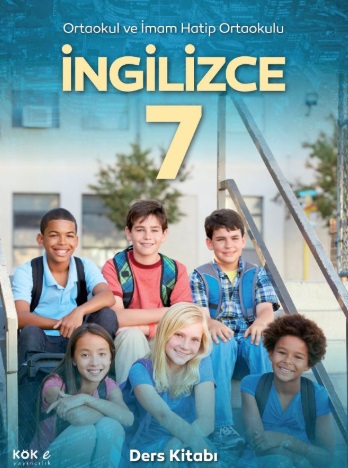
Units in the book; Appearance and Personality, Sports, Biographies, Wild Animals, Television, Celebrations, Dreams, Public Buildings, Environment and Planets.
One of the most important things that struck me about the content of the book is; in general, the negative sexism of the professions and sports I have seen in most books is not done.
For example, in the second unit on page 25, in the picture which put there to represent football, boys and girls are playing football in a mixed way, as is the case in volleyball. Also on page 30 we can see a blind athlete Öznur YILMAZER, and Yasemin ADAR, a female wrestler.
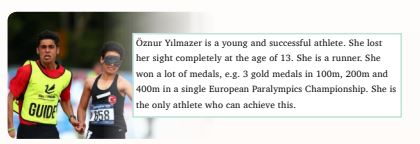
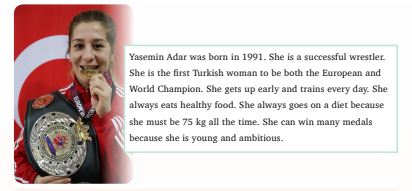
In the third unit Biographies we can see the gender equality too. Such as not only mentioning men figures but also women too. For example William Shakespeare and Marie Curie.
On the other hand In unit 8 Public Buildings, we can clearly see whitewashing. Almost all of the people in the pictures are White. And this can be cause racial problems in the classrooms.
And lastly Unit 9 Environment. This unit is probably the best unit for the social justice because most of the activities are about raising awareness about environmental problems. For example on page 108 activity 1, there is a request from students to talk about what they know about those environmental problems.
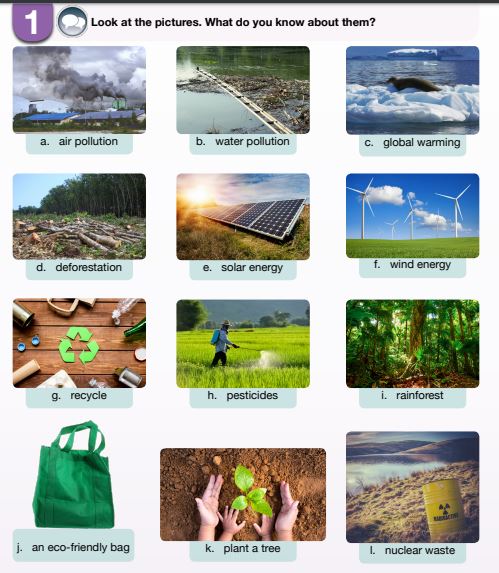
And on page 113 book wants from students to choose or create a campaign for those problems.
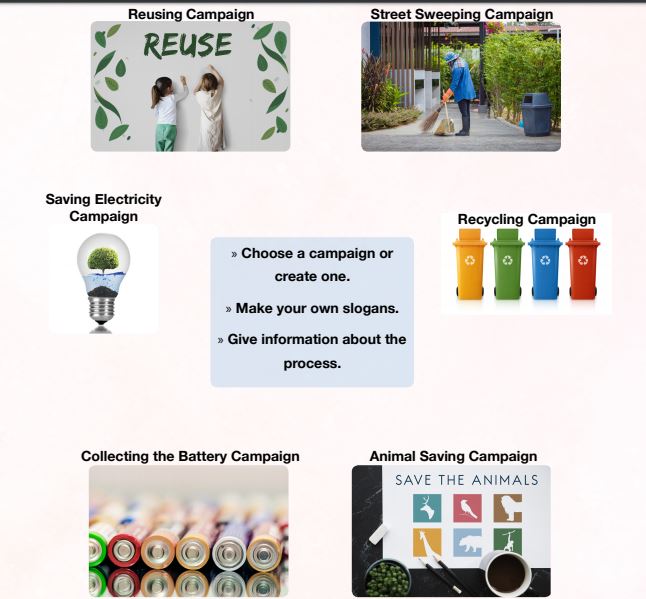
As a result of evaluation, as a teacher, I would certainly use this book in the context of social justice problems. Because I think it is appropriate for both social justice content and students' levels.
 Hello my name is Fahri YEŞİL. I was born on May 11, 1998 in Burdur. My parents work as a civil servant in the General Directorate of Security. I think they met by chance on a course. I went to Suna Uzal Primary School in Burdur until the 5th grade. Due to my family's appointment to Banaz county of Uşak province in 2008, I completed my education up to 8th grade in 31 Ağustos Secondary School. Then I went to Şehit Necati Sargın Anatolian High School until 11th grade, and then I spent the rest of my 1 year in Ordu Cumhuriyet Anatolian High School. I have been a student at Amasya University since 2016. Hello my name is Fahri YEŞİL. I was born on May 11, 1998 in Burdur. My parents work as a civil servant in the General Directorate of Security. I think they met by chance on a course. I went to Suna Uzal Primary School in Burdur until the 5th grade. Due to my family's appointment to Banaz county of Uşak province in 2008, I completed my education up to 8th grade in 31 Ağustos Secondary School. Then I went to Şehit Necati Sargın Anatolian High School until 11th grade, and then I spent the rest of my 1 year in Ordu Cumhuriyet Anatolian High School. I have been a student at Amasya University since 2016. |
|
I have been living in the Ordu since 2015. I cannot say that I like the city very much because it is far from the calmness I am used to in the cities I have lived before. On the other hand i love the nature of the city. Even though I don’t know how to swim, most of my days in Ordu goes like watching the sea. My favorite sport is football and I’m a big fan of Fenerbahçe. Also I am the chairman of the Amasya University UNIGFB community since 2018. My hobbies are mainly focused on technology like coding and web site designing etc. Also I love reading books.
|
 |
| My main reason to participate in this project is the fact that I realized that social equality has a critical role in creating the ideal world for today and for the future. And apart from that I want to share with the people that social equality is different from the well known term equality. The manners towards the refugees, acceptance of the people with the gender differences by the communities and educational equality for women and girls are the topics which I would like to study in this project. |
| |